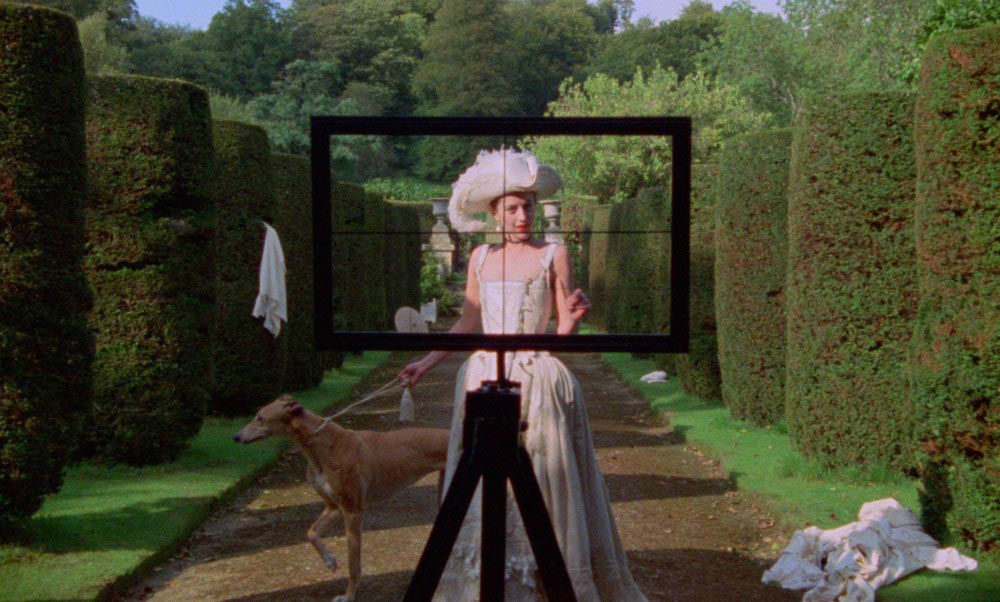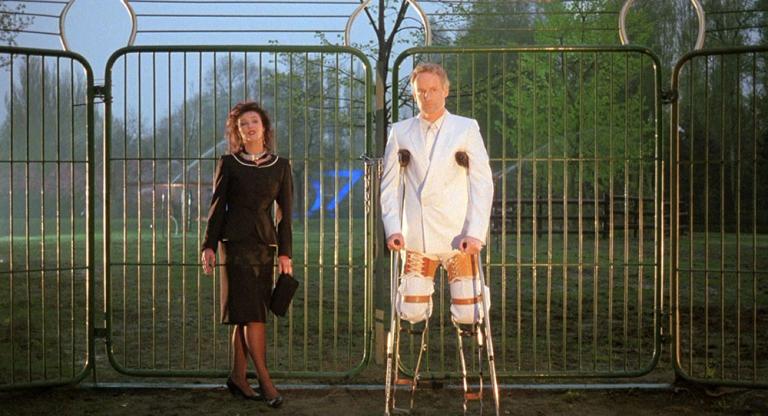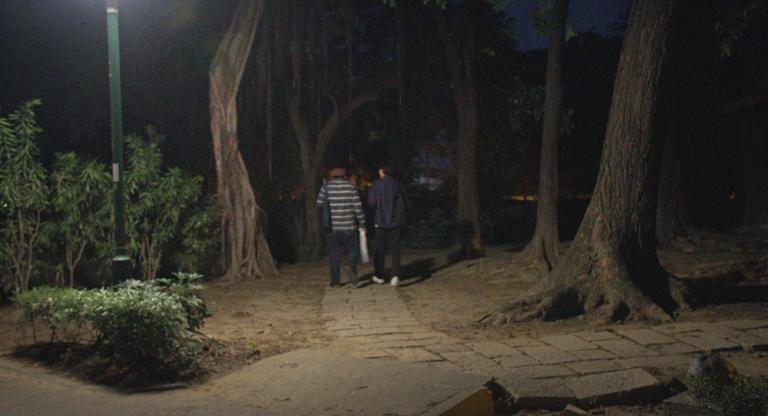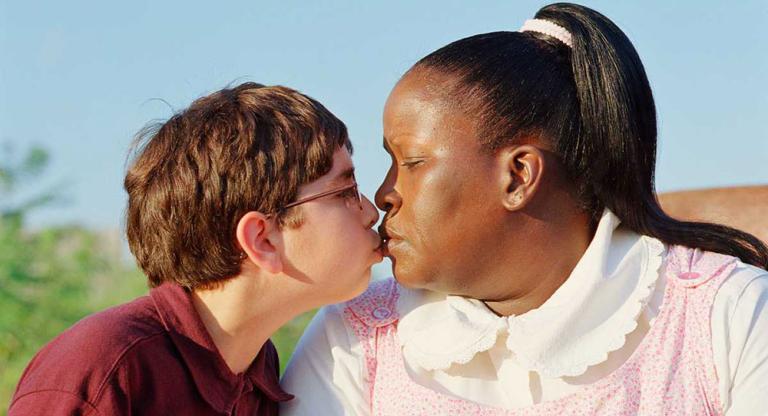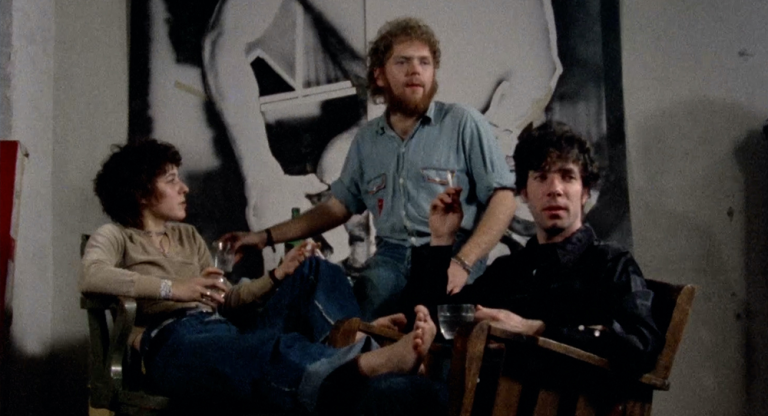In a streaming-forward era, it’s easy to grow nostalgic for the films of Peter Greenaway—spectacular works of decadent structuralism that can resemble museums come to life and that practically demand a cinema. Greenaway turned 80 earlier this year, and the British Film Institute declared him “one of our greatest living filmmakers,” rolling out a season of his movies, including The Cook, the Thief, His Wife & Her Lover (a feast featuring Helen Mirren, 1989), A Zed and Two Noughts (1985), a florilegium of his obsessional shorts, and more recent works that have felt nearly fictive for lack of exhibition (The Tulse Luper Suitcases, 2003–2005). Film Forum is doing its part with a restoration run of The Draughtsman’s Contract (1982), which is part floridly witty post-Restoration drama, part serpentine mystery, part aesthetic treatise on artistic practice and property. The commissioned artist of the title strikes a bargain with a British noblewoman that’s both schematic and sexual, but only deepens in its complications amid ample aristocratic intrigue; like many stretches of his work, ludic high art objects that often deconstruct a British cinema of quality, Greenaway manages to have his multitiered cake and eat it (while also smashing our faces in it).
A Peter Greenaway interview is its own subgenre, with its themes and variations invariably featuring a proclamation of cinema’s inferiority and infancy next to painting. But with his circuitous, plummy delivery—which might as well be the narration to one of his films’ secret histories—the man was a delight to listen to when I reached him at home in Amsterdam, home of the Dutch masters (including Rembrandt, subject of at least two Greenaway films). As it became amusingly clear that I would not land questions about his past films in any particular depth, I embraced his warm and endearing manner of chatting about this, that, and the other thing.
Nicolas Rapold: Before I ask you about The Draughtsman’s Contract, I have to tell you first that you might be partly responsible for my predicament of being a film critic.
Peter Greenaway: Really? Is that a good thing or a bad thing?
NR: So far, still good. I had a high school English teacher who, when we were learning Shakespeare, showed us your film Prospero’s Books [1991].
PG: Indeed, a version of Shakespeare's last play, The Tempest.
NR: Yes. And even now I can hear ringing in my head the call of “bo’s’n.” [The word is boomingly repeated in the film.]
PG: I’ll tell you an amusing tale about that. I took the film to a showing in Spain, and I was asked, “Mr. Greenaway, why do you open this film with a reference to the female human breast?” That for a moment got me really stumped. You know the word is “bo’s’n,” which is a corruption of the word “boatswain” in Elizabethan English, but he thought Gielgud was shouting out the word “bosom, bosom.” So I thought, I have to be very, very careful here.
NR: New audiences are seeing your work now through the British Film Institute retrospective. What has surprised you from people seeing your work for the first time?
PG: Well, it's rather strange. You pass the biblical threescore years and ten, and they begin to think that retrospectives are part of the game. I'm sure there are people who think I'm dead, I’m so goddamn old now. But as you can tell from my actually talking to you, I'm still alive. And still making films and still hoping to continue because the excitement of making movies is extraordinarily powerful.
NR: What are you currently working on? Are you still in post on Walking to Paris?
PG: I don't know whether it's Covid or a downturn in the economy or whatever else, but I used to make a film about once every 18 months—you know, twice the human gestation period: nine months to write the script and then nine months to make it and get it on a screen. But then it got very, very slow. Indeed, you're right, we were making a film about the Romanian sculptor who I believe changed sculpture in the 20th century: Brancusi, the extraordinary contemporary of people like Picasso. He influenced huge numbers of people in the sculpture world for certainly the last 60 or 70 years and still is doing so. He used to live in a tiny village just outside Bucharest and, when he was a young man, he had no money, his parents being very poor shepherds. At age 25 or 26, Brancusi realized there was no point in staying around the artistically backward countryside of Romania, which was still suffering from the “communist experiment.” He wanted to get to Paris where everybody else was—you know, Modigliani, etc. But he could not get there unless he walked, and it's about 2,000 miles to walk all the way across Europe. So it took him about two years. He wasn't in a desperate hurry because he wanted to have a look around and see things.
I thought this was rather an intriguing idea: a walk across Europe before the First World War, in about 1906. So that's what we made, but my producer, in his wisdom, created a complicated production plan where we have three co-producers: one Italian, one French, and the third one was Swiss. We chose these countries because this was [partly] where Brancusi eventually walked through: Romania, Hungary, Germany, Austria, Switzerland, and France. Of course he couldn't speak any of these languages. Only when he finally got to Paris he learned French. And we don't know much about this journey. Nobody knew who the hell he was, apart from his parents, and they weren’t very interested in what he was doing anyway, being shepherds. So he had lots of adventures: some of them erotic, some of them romantic, some of them quite dangerous. It was a world a bit like all those immigration/emigration problems we had about four or five years ago, people walking about Europe with no shoes on their feet, desperately looking for their next meal. I invented a lot of [the adventures], and we don't have any real evidence, but we do have his later sculpture. So I worked backwards. But that film got stuck with all these quarreling co-producers, and it is still even now in a Roman laboratory, being post-produced.
NR: So you finished shooting?
PG: Oh, the whole film is finished. But we have to grade it, we have to make a proper soundtrack, and we have to do all the post-production work on it. But as far as I’m concerned, it is ready and willing to go. There is some talk about it coming out at the Berlin Film Festival—what's that, next February? So that's the past film that’s already made. And I'm working with hopefully Morgan Freeman, who you might just have seen on your television sets, jumping around in a foreign country with the European soccer games. I’ve got him to try and play a figure who was based upon Jacob from the Old Testament, who wrestled with the gods. It's a film really about death. The Greeks said there were two areas of interest. One is Eros and the other Thanatos. Eros meaning the beginnings of our lives—I don't necessarily mean birth, but actually conception, copulation. And Thanatos, the end. Since I'm now 80, or was 80 some months ago, I'm now interested in Thanatos. I wanted to make a film about death to ask the extraordinarily stupid existential question: is death necessary? Do you think death is necessary?
NR: That’s a big question, but I suppose it is a natural process. Have you ever read the book Einstein's Dreams?
PG: Yes, I have.
NR: In it there is a parable about what people might do if they could live forever. Some do absolutely nothing, while others try to do everything.
PG: Yes. The sad thing is, everybody you know dies off very soon, don’t they? You're left in a rather lonely position, like the Wandering Jew, with no friends and no family. So there’s a great downside to it. I suppose the impetus for me is my father: he died a long time ago, but he was a gifted natural ornithologist, a bird watcher, and I took over a huge body of his knowledge. I realized that when he died, his huge amount of knowledge—and this was to be true about everybody, true about your father, true about our parents—goes when you die. Where does it go? It vanishes. Darwin said certain things worked out to our advantage. But it was rather tragic, isn't it, that notions of evolution have to cope with this fact that we're constantly throwing stuff away?
NR: True.
PG: I suppose some of it gets used—you mentioned Einstein. But so much gets lost. So I wrote this—don’t worry, it's not a zombie movie, but it is about death. It's saying, do we have any control over death? Can we organize things better? Is there such a possibility as a happy death? Have people ever been able to die happy? Probably the answer to that is no. And even less likely now that we seem to be just disappearing and descending into a world of dystopia, with all the most horrible things about to happen.
But it's about a group of three people, one of which is Morgan Freeman, who plays an elderly man who goes to Italy to look for his roots. He's looking if it's possible to have a happy death, but it's full of conversation about suicide and assisted death, which is very possible here from where I'm talking to you, the middle of Holland. But I don't think it's so possible in America, is it? Certainly not in places which still have a religious background. Can you arrange your assisted death?
NR: I don't believe so, but I haven’t tried. I guess you can also go to Switzerland. They have a process there.
PG: That’s true.
NR: When I was researching for the interview, I came across your statement from ten years ago in the Guardian [“I Plan To Kill Myself When I’m 80”]. So I was a little afraid when I scheduled the interview...
PG: Right, right! [chuckles] Well, we still haven't made the film because we're still quarreling. We have certain producers who want to make a Hollywood film. And that means they need huge amounts of money to fly people about, across America to Europe. But we're still hopeful. I’m actually writing a new script now, which is very much about Christianity. It's about notions of virgin birth and ideas of resurrection, etc. And it’s simply about Joseph. I have four children, and one of them came home from school one day and said, “How is it that Jesus Christ had two daddies?” She was only six years old, and she'd obviously just been taught by teachers about notions of the Bible. Well, I had to find an answer for her. How do you answer a six-year-old child who's been told that Jesus has two daddies? One is called God and the other is called Joseph. So I've written a script, which is now ready to go, called Joseph: a reconstruction of the First Gospel of the New Testament. It's going to cause a lot of fuss, but we’ll see. Always difficult to raise money for any sort of movie.
NR: Do your children share your artistic interests?
PG: Yes, I have three daughters and one son—three daughters who are now either in art school or have just left. So they're trying to create their own lives based upon notions of artistic creation. Not that I can say! I mean, I always wanted to be a painter when I was about 16 or 17. They're interested in painting just like I am, and I still paint. I still regard painting as more important than cinema. I hope that doesn't put you off.
NR: Of course not! In fact I was just in Amsterdam for IDFA—
PG: Ah yes! My wife has just won a prize.
NR: Yes, congratulations to her! While I was there, I went to the Rijksmuseum.
PG: I'm looking out my studio window now, and I can see the Rijksmuseum, where Rembrandt’s The Night Watch famously is kept. So I must be 700 yards away from Rembrandt's The Night Watch. Not that I can see it, because it’s indoors, but I enjoy going there.
NR: Let’s talk about The Draughtsman’s Contract. Is it true that part of the inspiration was your own experience with drawing a house, but being constantly interrupted?
PG: Yes, that's true. I've got four children from two marriages. When the first few children were very young, we used to go on holidays in the West of England, in the county of Wiltshire, which is quite near Salisbury. Beautiful cathedral there. I used to spend very, very happy, warm holidays. England used to be warm then. Not anymore. The weather is so terrible at the moment, gray skies as I look out the windows here—a presage of snow. So I had great times wandering around these beautiful countryside, woods and rivers, pushing the pram across tree routes and catching butterflies and so on. We used to stay in a beautiful Victorian house that used to be a convent. It was a beatific time. I’m getting wistful even thinking about it. This house was from something like 1820 and it wasn't particularly amazing, but it was very solid. And I was always fascinated that obviously when the sun went round, all the shadows changed. It meant for a lack of permanence. When you drew something in the morning, it's not going to look the same as it is in the evening.
So I would sit in the garden and draw this, and I thought, well, this would be a rather entertaining idea: it’s about time. And I wrote a film script and eventually made a very short film that was made in black and white. I was cameraman and it was shot on 16mm. So that really was the beginning of it. But I had made about 20 other films before then, very short experimental films related to current concerns in Europe and America about land art. You have a lot of great land artists right about the ’60s and ’70s, and so did we in the U.K. And I got excited about that because of an opportunity to be out and about in nature, which has always been one of my great excitements. I come from a family of naturalists, so it's not surprising that I was greatly influenced by them. I used to collect insects with my father. I didn't get on very well with my father. I didn't want to be too close to his interests. But I was fascinated. And I picked up huge amounts of knowledge from him about natural history. He studied birds, I studied what the birds eat—so I collected insects. And that was sort of a focal point of my interest in natural history at that time.
NR: Do you still have a collection of insects?
PG: Yes, I'm looking up at a shelf now behind me. I still have about 20-odd boxes of obscure insects. I actually gave up in the end because the insects I was collecting were getting rarer and rarer. And I was becoming a big game hunter, rather irresponsible, ecologically. But I tutored my kids, so they are now traveling—I think the fields of Italy and maybe Nepal and even Africa—and probably certainly looking at insects. I don’t think they collect them with the same avidity as I did. But nonetheless I've given them the idea. It's a fascinating subject.
NR: Watching The Draughtsman’s Contract again, I was struck by how the time period (1694) feels vividly foreign, partly because of the sexual politics, in the sense of women treated as chattel.
PG: Yes. Well, it hasn't really changed, has it?
NR: You’ve mentioned the Married Women’s Property Act in talking about the film, so were ideas of property foremost in your mind when making it?
PG: It was all in the background. Originally the film was absurdly long, about four hours long. That's not going to make it commercially very likely that people would spend time looking at it. So I was persuaded to cut it down. But yes, it had all that stuff in the background, all the fruit symbolism, references to obscure painters of that time, most of whom were Dutch. We didn't really have any English painting round about 1694. That didn't come until the following century, round about 1750s, people like Hogarth, etc. I think it’s mentioned in the film. But then the English have not been visually very inspired. The English always pat themselves on the back by being great literary people: Shakespeare Dickens, etc. I think the English can only produce three good painters: probably Constable, maybe Gainsborough, and much more latterly somebody like Francis Bacon. Whereas the French and the Italians, you know, create painters overnight. There are hundreds and hundreds and hundreds of them.
NR: Did you feel any sort of kinship with Bacon or other painters?
PG: Well, when I was at art school in the late ’50s for four years, I was there to learn to paint, but there was an awful lot of theory and background history. I was not very keen on Bacon to begin with. I thought he was just a sensationalist. But I've learned to realize how important he is, getting all the perspectives right. Whether he'll be regarded as important in one hundred years’ time, who knows? He's certainly fetching enormous prices for his paintings now, isn't he?
NR: I’ve also been thinking about the influence that you've had on other artists, perhaps in the art world as well as in film. Could one imagine someone like Matthew Barney being indebted to you?
PG: Maybe, maybe. But a lot of filmmakers, too, I think. There are filmmakers who seem to be making Greenaway films without Greenaway’s name being attached. But that's okay.
NR: You were also an early adopter of high-definition, is that right?
PG: I certainly jumped into the pond of digital cinema! I find it very exciting. Because you can do all sorts of things with celluloid, but you can't actually change some pixels, can you? And now we can. With CGI and computer-driven material, I can be a painter all over again, we all can. You and I can change the shape, size, color, density, grading—absolutely everything of every single part of a picture. And that after all is what paintings have been doing for the last—what is it, there were cave paintings 45 thousand years ago in the south of France. Whereas poor ol’ cinema was invented in 1895. Maybe it's crass for me to complain about how inefficient and unsatisfactory it is, because it's still in diapers, isn't it? Still got a dummy [i.e., pacifier] in its mouth.
NR: Speaking of draughtsmen, do you still draw?
PG: Yes, everything keeps going. I think maybe it was a dictum that I was force-fed at art school: the drawing is the basis of all visual manufacture. The best way to understand a thing is to draw it, because that implies intense visual activity. I suppose the major means of communication all over the world is essentially text, words, and we never spend as much time, as much energy, as much imagination, over images. As I speak English words to you and you speak English words to me, we're quoting, aren't we? Hundreds and hundreds and hundreds and hundreds of literati that have been going before us. Why can't we also use the notion of the imagery of the world to excite and fascinate?
NR: Then again some say there's quite a bit of imagery flying about on social media like Instagram.
PG: I think it was the German filmmaker Wim Wenders who made that complaint, and also Tarantino. But I would say exactly the opposite. Bring it all in! Let's have a look! It's all part of the grist to the mill of being human beings and being excited by the phenomena of the world. I'm not so sure cinema is quite the same thing as it was for our grandfathers. Cinema was invented as a public art, and we all went down the high street and we sat together in a crowd. But I bet you, as a professional critic, and me, as a professional filmmaker, we spend more of our time alone, either in our bedrooms, our offices or workplaces, actually looking at single screens on our own. Maybe every now and again, we use cinema as an event, but it's not a common practice so much anymore.
NR: It depends—I'm fortunate to be in New York where we have plenty of repertory cinemas. So I might just go out and see a Hollis Frampton film at Anthology Film Archives.
PG: Good, good!
NR: To come back to your work, your films have attracted a number of prominent actors, such as John Gielgud in Prospero’s Books. Was that originally through developing a relationship with him with A TV Dante [1990]?
PG: That's how it began, yes. Gielgud had a great competitor when he was alive: Laurence Olivier. You’ve heard of Laurence Olivier? Married to Vivien Leigh, Richard III, Henry V, etc. Olivier managed to get most of his performances on screen. That means even after his death, you can still see him. There's very little evidence really of Gielgud. But he always had this crazy idea—he was a very eccentric man anyway—that Shakespeare had actually written the role of Prospero for him four hundred years ago. It’s sort of a pleasurable idea because Gielgud was always known to be an actor from the neck up. He had a beautiful voice and could elucidate very well. Morgan Freeman has the most extraordinary voice too, and I think also is an incredibly optimistic figure, isn’t he? He always plays the decent man.
NR: And he’s played God.
PG: Yes, he’s played God! I’ll hopefully be working with him. I have all sorts of plans, and most of them don't work out. Don’t you agree most plans don't work out?
NR: We all do our best, I suppose.
PG: I try to.
NR: What movies have you been watching?
PG: I saw the remake of Dune [2021]. I'd always liked the Lynch film, a very unpopular film, but I really enjoyed the imagination there. I liked the widescreen organization of the information. I also really enjoyed the second version of Blade Runner [2017]. I enjoyed the first version as well. I always admired the films of Ridley Scott. Although he's a Hollywood man, he has an extraordinary eye, very exciting visually.
NR: I agree.
PG: Isn’t it amazing? Alien [1979], Gladiator [2000], Blade Runner [1982]. Beautifully made. I always have an idea that we speak in nouns and verbs and prepositions, and most of us spend too long on the tiny words, the prepositions. But Ridley Scott, there were no prepositions! Every single goddamn shot is beautifully made and well organized and magnificently edited. There's a beautiful sequence in his version of Hannibal [2001]. He goes to Italy and he gets involved in the suicide of Judas Iscariot in the Uffizi Gallery in Florence. Magnificent sequence. Most films are flawed, aren’t they, but most films have got something, even if it's only two seconds of something interesting. And I think Ridley Scott, time after time after time, comes up with some extraordinary imagination. Three cheers to that man. I think he's much older than me! He's about 88, isn’t he?
NR: Around there.
PG: Long may he live! I hope to make a couple more movies yet. And I’m very sorry for having introduced you into cinema. I hope it hasn’t been too uncomfortable.
The Draughtsman’s Contract screens December 2–8 at Film Forum in a new digital restoration.
